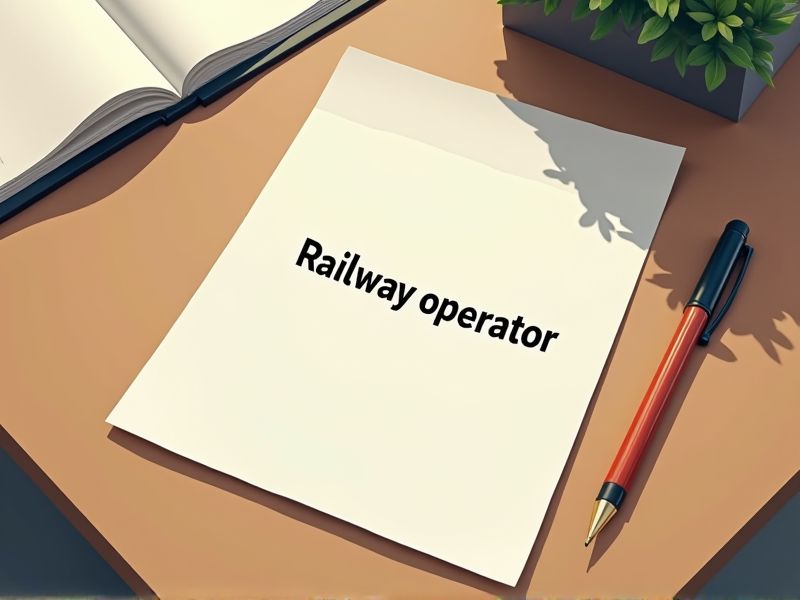
Railway operators need specific certifications to ensure safety and compliance with national and international regulations. Proper certification verifies that operators are knowledgeable about the complex systems they handle, which reduces the risk of accidents on the rail network. It also guarantees operators are trained in emergency procedures, enhancing overall passenger safety. Here are some essential certifications required for a Railway operator.
Federal Railroad Administration (FRA) Operations Certification
Obtaining FRA Operations Certification ensures railway operators adhere to federal safety regulations, reducing the risk of accidents. Certification facilitates standardized training, promoting consistent operational procedures across the rail industry. Having certified operators can improve public trust in railway services due to enhanced safety and reliability. The certification process supports continuous professional development, keeping operators informed about the latest technologies and practices.
Locomotive Engineer Certification
Locomotive Engineer Certification ensures that operators have the necessary knowledge and skills to safely operate trains, preventing potential accidents. Certification compliance is a legal requirement, aligning with federal safety standards that govern railway operations. The certification process includes rigorous testing and evaluation, which helps maintain a high level of competence among engineers. A certified workforce enhances public confidence in the safety and reliability of rail transportation services.
Signal Systems Certification
Signal Systems Certification ensures railway operators have the necessary skills to maintain and operate complex signaling equipment safely. Without proper certification, there is a higher risk of operational errors, which could lead to accidents or service disruptions. Regulated certification processes improve consistency and reliability in railway signaling practices. Certification standards provide assurance that operators meet industry and safety regulations.
Track Safety and Maintenance Certification
The Track Safety and Maintenance Certification ensures railway operators adhere to stringent safety standards, reducing the risk of accidents. It mandates comprehensive training, enhancing the skills of personnel involved in track maintenance activities. Certification often leads to better inspection protocols, identifying potential track faults before they become hazardous. By adhering to certified procedures, operators boost public confidence in railway safety.
OSHA Safety Compliance Certification
Railway operators face substantial safety risks due to the complex nature of rail operations and infrastructure. Compliance with OSHA safety certification ensures that operators adhere to stringent safety regulations, reducing accident potential. Certification fosters a safer working environment, which can lead to fewer worker injuries and reduced financial losses. Compliance also enhances public trust in the railway system, influencing ridership and operational sustainability positively.
Hazardous Materials (HAZMAT) Endorsement Certification
Hazardous Materials (HAZMAT) Endorsement Certification is crucial for railway operators as it ensures the safe transportation of dangerous goods, minimizing the risk of accidents and contamination. This certification demonstrates a thorough understanding of proper handling and emergency procedures, reducing the potential for hazardous spills or leaks during transit. Regulatory compliance requires operators to meet specific training standards to mitigate environmental and public safety risks associated with hazardous materials. Enhanced operator expertise, facilitated by the certification, increases overall railway safety and operational efficiency.
Railway Safety Management Certification
Railway Safety Management Certification ensures operators adhere to stringent safety standards, reducing the likelihood of accidents. It builds trust among passengers and stakeholders by demonstrating a commitment to maintaining the highest safety protocols. Certification also mandates regular training and assessment, which enhances the capabilities of the workforce and keeps them updated with the latest safety practices. Regulatory compliance is achieved through certification, which helps avoid legal penalties and operational disruptions.
Railroad Dispatching Certification
Railroad dispatching certification ensures that operators are equipped with the necessary knowledge to manage train movements safely and efficiently. By standardizing operational protocols, the certification reduces the likelihood of human error, which can lead to accidents and service disruptions. It enhances communication skills among dispatchers and other rail personnel, fostering a coordinated and effective operational environment. This certification also aligns operators with federal and industry regulations, ensuring compliance and minimizing legal and financial risks for railway operators.
Emergency Response and First Aid Certification
Railway operators often face high-stakes situations where quick decision-making is crucial, and having emergency response certification equips them with the necessary skills to act effectively. Trains operate in environments where passengers can experience medical emergencies, and first aid certification ensures operators can provide immediate care. In the event of an accident, certified personnel can manage the situation more efficiently, potentially reducing fatalities and injuries. Regulatory bodies in the transportation sector might mandate such certifications to ensure a standard level of safety across all operations.
Advanced Train Control Systems (ATCS) Certification
Acquiring Advanced Train Control Systems (ATCS) certification enhances safety by ensuring railway operators are proficient in handling the complex technology essential for preventing accidents. Certification also improves operational efficiency by equipping operators with skills to manage train schedules and traffic more effectively. Railway operators with ATCS certification demonstrate compliance with industry standards, fostering trust among passengers and stakeholders. Additionally, certification aids in the integration of modern technologies, supporting the evolution of railway infrastructure to meet contemporary demands.
Summary
When you choose a railway operator with certifications, you can anticipate enhanced safety standards and operational reliability. Certified operators are often required to adopt advanced technologies and adhere to strict maintenance protocols, leading to fewer service disruptions. The rigorous auditing process behind certifications ensures compliance with industry regulations, which can result in improved passenger satisfaction. By relying on accredited operators, you indirectly support sustainable and eco-friendly transportation initiatives.
